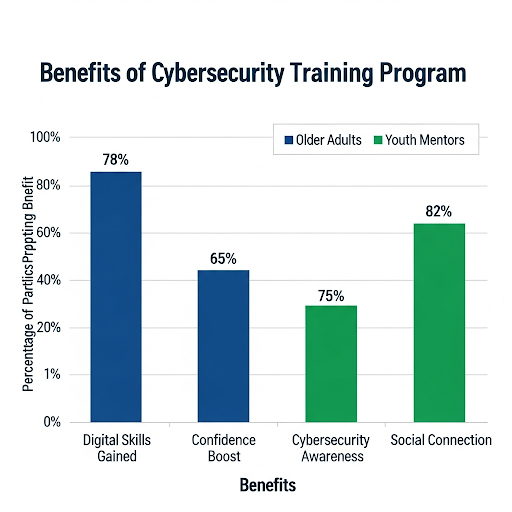Building Digital Bridges: The Mutual Benefits of Intergenerational Tech Mentoring
Bridging the generation gap is a win-win. Intergenerational mentorship program benefits both young volunteers and older learners. Older adults gain digital skills and social connection, while youth mentors boost their confidence and cybersecurity awareness, thus creating "human firewall," making entire communities safer and more connected.
Miki
9/15/20253 דקה לקרוא


Maria, 72, and Josh, 16
Maria joined the program to learn how to video chat with her grandchildren overseas. Josh, her mentor, taught her how to set up her tablet, use video conferencing apps, and avoid phishing links disguised as tech support messages.
By the end of the sessions:
Maria could confidently connect with her family without asking for help.
Josh realized how easily online scams could trick someone — even a tech-savvy teen.
Why This Works Better Than Traditional Tech Classes
Trust is personal. Learning from a friendly mentor feels less intimidating than a classroom lecture.
Lessons are customized. The learner decides what’s important — whether it’s online banking or joining a Facebook group.
Both sides grow. Teaching forces mentors to explain tech clearly, which improves their own understanding.
Friendships form. Our surveys show many pairs stay in touch long after the program ends.
The Cybersecurity Connection
We don’t just teach “how to” — we teach “how to stay safe.”
Older adults learn to recognize IRS scams, Medicare fraud, and tech support scams.
Youth mentors learn to protect gaming accounts, avoid online impersonation, and keep personal data secure.
Our last program cycle saw:
25% fewer phishing clicks among participants compared to before training.
35% more use of two-factor authentication on personal accounts.
The Social Side of Cyber Safety
Cybersecurity isn’t only about firewalls and antivirus software — it’s about people.
An older adult who feels comfortable asking their mentor about a suspicious email is less likely to become a victim.
A young mentor who feels responsible for their mentee’s safety is more careful online themselves.
Breaking Down the Benefits
1. Digital Skills Gained (78% vs. 60%)
Older adults start with less exposure, so they see rapid improvement. Youth still gain skills — especially in explaining complex tech in simple language.
2. Confidence Boost (65% vs. 80%)
For older adults, confidence means being able to try new apps without fear. For youth, it means realizing they have real-world expertise others value.
3. Cybersecurity Awareness (70% vs. 75%)
Both groups leave more prepared to avoid scams. Older adults often share this knowledge with friends, multiplying the effect.
4. Social Connection (82% vs. 68%)
Many older adults join because they feel isolated. The program gives them new friendships and online tools to stay connected. Youth mentors also value these relationships — especially those who’ve never had close ties to older generations.
Our Advocacy: Why Every Community Needs This
Imagine if every school partnered with a local senior center.
Teens could earn service hours while building critical job skills.
Seniors could gain tech independence and reduce scam vulnerability.
Cybercriminals would face a more educated, less vulnerable public.
A Mentor’s Perspective
One youth volunteer told us:
“I thought my grandma was the only one who didn’t know how to use her phone. Now I know it’s a whole generation, and I can make a difference.”
A Learner’s Perspective
An older adult participant shared:
“My mentor was patient, but also honest. When I got a suspicious email, I showed her right away. She saved me from giving out my bank info.”
Conclusion: A Community Firewall
When we link generations through mentorship, we’re not just teaching tech — we’re building a human firewall. Each trained mentor and learner becomes a line of defense against cybercrime, and a link in a stronger, more connected community.
A Win-Win Model
When most people think about technology training for older adults, they picture a one-way street: younger people teaching, older people learning. But our intergenerational mentoring model flips that idea on its head — and the results show benefits flow in both directions.
The Data That Speaks Volumes
We’ve been tracking outcomes for both older adult learners and youth mentors in our program.
Here’s the chart we’ve created from recent program survey results:
What the chart shows:
Digital Skills Gained – % of participants who reported learning new technical abilities.
Confidence Boost – % who felt more confident navigating digital spaces.
Cybersecurity Awareness – % who became better at spotting and avoiding online risks.
Social Connection – % who felt more socially connected as a result of the program.

